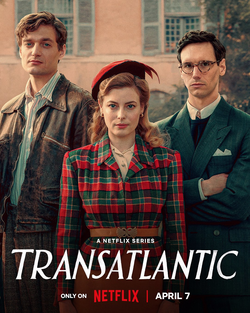APRIL 16, 2023 – (Cont.) I was soon drawn into the series by the wits and courage of the protagonists. They were young and well-educated Americans who put grand-scale principles of personal gain, pleasure and safety. They exhibited unusual chutzpah and were leagues ahead of their government in understanding the full implications of the coming Nazi onslaught—already underway to a degree largely ignored by Americans in the year running up to the attack on Pearl Harbor. What also struck me was the relative helplessness of the refugees. Many of them people without a country, they were artists and thinkers, not special military forces. Against the ceaseless attempts to evade the authorities and the ERC’s tireless work to save lives, the artists and philosophers had little control of their destinies.
To save the life of writer Walter Benjamin, the ERC essentially imprisoned him in his room at the Hotel Splendide. (Ironically, by the time he was finally spirited to the Spanish border by Lisa Fittko, he’d run out of hope and committed suicide.) Most of the others too were at the mercy of the fascists, on the one hand, and the judgment—and courage—of Fry, Gold and their accomplices, on the other. The Colonials who staffed the hotel (fictional characters), were portrayed as brave exceptions—motivated by the chance for independence from the French when the war was over.
Another exception to the deer-in-headlights syndrome affecting most refugees was a 25-year-old international scholar and Jewish-Berliner, Otto-Albert Hirschman. Four years earlier he’d fought on the side of the Republicans in the Spanish Civil War, and he brought singular and courageous flair to the fight against fascism. Despite several opportunities to escape to America, he dedicated himself to rescuing more refugees. In the end he sacrificed his blossoming romance with Mary Jayne Gold, who finally yielded to her father’s demands and escaped to Lisbon, then New York. (Hirschman would later find his way to America too and led a distinguished Ivy League career as an academic economist. He lived to be 97.)
Throughout the series I had to hit the pause button and conduct a fair amount of online research on each of these extraordinary people fleeing the nonsense of fascism. As I delved further into their works, the deeper my interest and respect. Thousands more followed, adding to the unintentional but inevitable genius of the United States.
But of course, millions of artists, thinkers, musicians, academics, doctors, lawyers, mothers, fathers, sisters, brothers, sisters, grandparents, aunts, uncles, cousins and comrades didn’t make it to safety. Who knows what brilliance was extinguished before its time?
Transatlantic is suspenseful and provocative, replete with riveting tension in plot and interaction of characters. With high production values to boot, the series qualifies as great film entertainment. Yet what makes it of lasting value is its informative introduction of real life people about whom I should know much more. Their portrayal piqued the my curiosity to such a degree, I discovered that the show wasn’t over when it was over.
What an amazing world this has always been!
But there’s more. (Cont.)
(Remember to subscribe to this blog and receive notifications of new posts by email.)
© 2023 by Eric Nilsson
